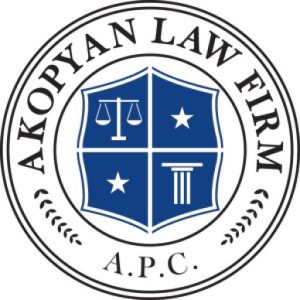Vista Employment Law Attorneys
Employment Litigation in Vista, California
Vista is a thriving city located in the northwestern corner of San Diego County. Known for its rolling hills, family-friendly neighborhoods, and expanding business community, Vista offers a mix of suburban comfort and entrepreneurial energy. With a population of more than 100,000 residents, the city continues to grow as one of North County’s key economic and cultural centers.
The city’s history stretches back to the late 1800s, when it began as a small agricultural settlement known for its citrus and avocado groves. Vista was incorporated in 1963, and since then it has steadily evolved into a modern city with a balanced mix of residential, commercial, and industrial development. Its economy now includes manufacturing, education, healthcare, retail, and public service — all of which contribute to a diverse employment landscape that reflects the broader Southern California workforce.
Akopyan Law Firm, A.P.C. represents employees and employers in Vista in all forms of employment litigation. Our attorneys focus exclusively on employment law disputes and bring years of trial experience to every case.
Employment Law in Vista
Vista’s workforce represents nearly every sector of California’s economy — from construction and technology to education, healthcare, and service industries. With that diversity comes a complex web of employment laws that govern workplace conduct, wages, hours, and employee rights. When those laws are violated or misapplied, litigation may be the only way to resolve the conflict.
Akopyan Law Firm handles employment litigation throughout Vista and the surrounding region. Our attorneys represent clients in cases involving wrongful termination, discrimination, harassment, retaliation, and wage-and-hour violations. We prepare each case carefully, working to protect our clients’ rights and achieve meaningful results through skilled advocacy.
Representation for Vista Employees
Employees in Vista play a central role in the city’s success. Whether working in education, manufacturing, healthcare, or retail, they are entitled to work environments that comply with California’s strict employment laws. When employers violate those laws, employees have the right to take action.
Akopyan Law Firm represents Vista employees who have experienced wrongful termination, harassment, discrimination, retaliation, or unpaid wages. Our attorneys understand the challenges that come with these situations and provide clear, practical guidance backed by strong litigation experience. We are committed to helping employees assert their rights and pursue just outcomes in court.
Employment Litigation for Vista Employers
Vista’s business community includes small enterprises, family-owned companies, and large regional employers. Even well-managed organizations can face employment-related lawsuits, which can disrupt operations and carry significant financial and reputational risks.
Akopyan Law Firm defends employers in Vista in litigation involving claims of discrimination, harassment, retaliation, wrongful termination, and wage-and-hour violations. Our attorneys are experienced litigators who understand how to navigate employment disputes effectively. We work to protect employers’ interests while pursuing efficient and decisive resolutions.
Vista’s Community and Workforce
Vista’s blend of established neighborhoods, growing industry, and cultural vitality gives it a unique identity within North County. Its workforce is diverse and dynamic — a mix of long-time residents, young professionals, educators, and skilled tradespeople. The city’s commitment to economic development and community engagement continues to attract new employers and job opportunities, creating an ever-changing employment environment.
Akopyan Law Firm understands the community-driven nature of Vista and the wide variety of workplace issues that arise within it. Our litigation practice is built on experience, professionalism, and a strong dedication to advocacy for both employees and employers involved in workplace disputes.
Contact Akopyan Law Firm, A.P.C.
If you are an employee or employer in Vista facing an employment law dispute, Akopyan Law Firm is ready to assist you. Our practice is dedicated solely to employment litigation, and our attorneys have extensive experience representing clients throughout Southern California.
To discuss your case or schedule a confidential consultation, contact Akopyan Law Firm, A.P.C. today. Our team provides skilled representation and focused advocacy in every employment law matter we handle.
We Can Help Vista Residents With Cases Involving:
Featured Article:
Economic Damages in Southern California Constructive Discharge Cases: What “Lost Wages” May Include
📌 Key Takeaways In Southern California constructive discharge cases, “lost wages” may include income a worker stopped earning after the employment relationship ended, as well as certain regularly earned pay components beyond the base pay. A resignation may be treated as a termination if working conditions became so intolerable that a reasonable worker would feel compelled to resign. Past wage loss often focuses on what stopped—for example, the hourly wages or salary that ended when the job ended. “Wages” may include more than base pay when overtime, shift differentials, piece-rate earnings, production bonuses, or commissions were regularly earned. ~ ~ ~ ~ ~ ~ ~ ~ ~ ~ ~ ~ ~ ~ ~ ~ ~ ~ When workplace conditions become intolerable, some California workers resign because they believe continuing the job is not realistic. In certain situations, that resignation may be treated under California employment law as a constructive discharge (sometimes called constructive termination). When constructive discharge is at issue, wage-based economic damages—including “lost wages”—may become part of the legal analysis. This article provides general information about how “lost wages” may be evaluated in that context for California workers who believe they were effectively pushed out of their jobs. The discussion is often relevant to workers in jobs where steady hours, overtime, or shift pay are a regular part of earnings, including construction, warehouse operations, manufacturing, retail, food service, and delivery. Some workers also have disabilities or qualifying medical conditions. When a worker requests a reasonable accommodation, participates in the interactive process, or takes job-protected medical leave, an employer’s response may become legally significant. If a worker later resigns after increased scrutiny, reduced hours, discipline, or other adverse treatment, the timing and sequence can matter when evaluating whether the resignation may be treated as a constructive discharge and whether wage-based economic loss may be implicated. How Constructive Discharge Relates to Wage-Based Economic Damages in California Under California law, a resignation may, in some circumstances, be treated as a termination. When a resignation is treated as a termination, wage-based economic damages may be part of a claim that the employment ended in a way that may violate the law. A Southern California employment attorney may review how and when pay stopped, how the worker’s earnings changed after leaving, and whether the facts may support a causal connection between protected status or protected activity and the working conditions that preceded the resignation. The evaluation is fact-specific and depends on the details of the workplace, the worker’s role, and the employer’s decisions. What “Lost Wages” May Mean in a Constructive Discharge Claim In this context, “lost wages” generally refers to wage-based economic loss a worker may claim resulted from an employment ending that may violate the law. The analysis often focuses on: Past wage loss after pay stopped; Potential future earnings impact; and Regular forms of compensation beyond base pay, such as overtime or shift differentials. Past wage loss often focuses on the pay a worker likely would have continued to receive... Read more
Common Patterns in Constructive Termination Disputes in Southern California
📌 Key Takeaways A resignation may be treated as a termination if working conditions became so intolerable that a reasonable person would feel compelled to quit. Medical Restrictions Ignored: Employers who repeatedly assign tasks that conflict with documented medical limitations may create legally intolerable conditions. Timing Suggests Retaliation: Sudden schedule changes, reduced hours, or increased discipline shortly after disability disclosure or protected leave may indicate discriminatory intent. Interactive Process Failures: Employers who refuse to consider available light-duty tasks or alternative assignments may violate disability accommodation obligations. Pressure Tactics Undermine Voluntariness: Pre-drafted resignation documents presented under threat of termination may not constitute truly voluntary departures. Documentation Shifts Signal Problems: Neutral performance reviews that suddenly turn negative after accommodation requests may suggest the employer is building a termination record. Coerced resignations under disability-related pressure may carry legal weight beyond the paperwork. Southern California workers who resigned after repeated medical restriction violations, post-leave scheduling changes, or disability-related discipline will recognize actionable patterns here, preparing them for the detailed legal framework that follows. ~ ~ ~ ~ ~ ~ ~ ~ ~ ~ ~ ~ ~ ~ ~ ~ ~ ~ If you are a worker in Southern California who resigned after an injury, disability, or serious medical condition, you may question whether the resignation was truly voluntary. In some cases, a resignation may be treated as a termination if the worker can prove constructive discharge based on intolerable working conditions. In California, constructive discharge generally refers to a resignation that may be treated as a termination when working conditions become so intolerable that a reasonable person would feel compelled to resign, and the worker actually resigns because of those conditions. Patterns Involving Workers with Disabilities Who Are Assigned Tasks That Conflict with Medical Restrictions The examples below are hypothetical and illustrative and are not intended to predict the outcome of any case. Disregarding Medical Restrictions After an Injury or Diagnosis A common allegation arises when an employer acknowledges medical restrictions (for example, limits on heavy lifting, climbing, prolonged standing, or overhead work) but supervisors continue assigning tasks that conflict with those restrictions. If the worker is repeatedly placed in assignments that risk reinjury or discipline for following restrictions, the worker may argue the employer created intolerable conditions. Refusal to Consider Light Duty or Alternative Tasks Another pattern appears when alternative tasks exist, but the employer does not meaningfully consider them as potential reasonable accommodations. For example, a worker may be capable of scanning, packing, inventory tasks, dispatch support, or other less strenuous duties, yet the employer keeps the worker on the most physically demanding line. A failure to engage in a timely, good-faith interactive process or a refusal to consider reasonable accommodations may have legal significance. California law, including the Fair Employment and Housing Act (FEHA), and federal law, including the Americans with Disabilities Act (ADA), may protect workers with disabilities from discrimination and retaliation and may require employers to engage in a timely, good-faith interactive process to explore reasonable accommodations. Patterns... Read more
Constructive Discharge and Escalating Discipline in California Workplaces
📌 Key Takeaways Escalating discipline after a disability-related event or a request for reasonable accommodation can become important evidence in a constructive discharge evaluation for California workers. Discipline patterns can matter. If an employer begins issuing repeated write-ups, imposing performance improvement plans (PIPs), or changing schedules after an employee discloses a disability or requests a reasonable accommodation, those actions may become relevant to later legal claims. Timing can support an inference. When an employer starts serious discipline soon after an employee requests to engage in the interactive process, the employee may later allege the timing supports disability discrimination or retaliation. Unequal enforcement can be evidence. If an employer disciplines an employee with a disability for minor conduct that similarly situated co-workers without disabilities do not get disciplined for, that inconsistency may support an argument of selective enforcement. Medical restrictions should be addressed. If an employer receives documented medical restrictions but keeps quotas or performance standards unchanged—and then disciplines the employee for failing to meet those unchanged standards—the employee may allege a failure to accommodate or a failure to engage in the interactive process. Workplace statements can increase pressure. Comments by a supervisor suggesting the employee should “move on” or find “something less physical,” when paired with escalating discipline, may be alleged as pressure to resign rather than a good-faith effort to solve the problem. When disability-related disclosures, escalating discipline, and suggestions to leave begin to align, the paper trail—write-ups, PIPs, schedules, evaluations, emails, and texts—may matter as much as the resignation itself. ~ ~ ~ ~ ~ ~ ~ ~ ~ ~ ~ ~ ~ ~ ~ ~ ~ ~ Not every job ends with a direct termination. In some cases, an employee resigns and later alleges the employer effectively forced the resignation by creating or allowing intolerable working conditions. That allegation is commonly described as constructive discharge. In plain terms, constructive discharge generally refers to working conditions that are alleged to be so intolerable that a reasonable person would feel compelled to resign—and the employee does resign because of those conditions. The analysis is usually fact-specific. It often turns on what the employer did, when it happened, what the employer knew, and whether the employer addressed the problem when it had the opportunity to do so. In disability-related situations, constructive discharge allegations often involve patterns that develop over time, such as escalating discipline, shifting expectations, and communications implying the employee is no longer a fit after the employee discloses a disability or requests a reasonable accommodation. How Performance Management Typically Works in Hourly and Physically Demanding Jobs In workplaces such as construction, warehousing, manufacturing, retail, food service, landscaping, and delivery, performance management often involves multiple tools rather than a single annual review. For example: A supervisor may hold a verbal warning or “coaching” meeting about speed, accuracy, safety, attitude, or attendance. An employer may issue written warnings for safety violations, timekeeping mistakes, or policy violations. An employer may use attendance point systems or strict call-in rules that trigger... Read more
When Major Pay, Hours, or Job Duty Changes May Be Treated as Constructive Discharge in California
📌 Key Takeaways Significant negative changes to pay, hours, schedule, or job duties—especially after an employer learns of a worker’s disability or qualifying medical condition, medical restrictions, or a request for reasonable accommodation—may support a constructive discharge analysis under California employment law, depending on the facts. A resignation may be treated as involuntary if an employer creates or allows working conditions that become objectively and subjectively intolerable, and the worker resigns because of those conditions. Sudden loss of overtime, deep hour cuts, or reassignment to a lower-paying position after medical disclosure or an accommodation request may be relevant to whether an employer applied financial pressure tied to protected status or protected activity. Schedule changes—such as rotating graveyard shifts, split shifts, or constantly changing start times—can matter when they interfere with treatment and recovery and begin after the employer receives medical restrictions or an accommodation request. Assigning duties that conflict with known medical restrictions may raise issues under disability-discrimination and reasonable-accommodation principles, including whether the employer engaged in the interactive process in good faith. Documentation often matters, including pay records, time sheets, job descriptions, written medical restrictions, and communications about scheduling, duties, and complaints. ~ ~ ~ ~ ~ ~ ~ ~ ~ ~ ~ ~ ~ ~ ~ ~ ~ ~ In California, resignation is not always treated as purely voluntary. In some situations, significant negative changes to pay, hours, scheduling, or job duties may be analyzed under the doctrine of constructive discharge. In general terms, constructive discharge is alleged when an employer’s actions (or failure to act) create working conditions that are so intolerable that a reasonable person would feel compelled to resign, and the worker actually resigns because of those conditions. Courts typically evaluate constructive discharge based on the totality of circumstances, including the severity of the conditions, whether the resignation was caused by those conditions, and whether the employer caused or failed to remedy the conditions. When Working Conditions May Support a Constructive Discharge Claim Many workers describe resigning only after conditions changed in ways that made continued employment unrealistic. For example, a worker may return after an injury to frequent schedule changes, more physically demanding assignments, and reduced income. Another worker may provide medical restrictions and then experience increased scrutiny, disciplinary write-ups, or job reassignments shortly afterward. A key issue is not simply whether the worker resigned. The issue is whether the employer’s conduct (or lack of corrective action) created conditions that could be argued to be intolerable and effectively left the worker with no reasonable alternative but to resign. Major Pay Changes That May Increase Pressure to Resign Sharp reductions in earnings may be relevant in a constructive discharge analysis, particularly when they follow an employer’s awareness of a worker’s disability or qualifying medical condition, medical restrictions, or a request for reasonable accommodation. Examples may include: Loss of overtime that a worker previously relied on, beginning soon after the worker submits medical restrictions or requests an accommodation. Deep reductions in scheduled hours that significantly... Read more
Constructive Discharge and Retaliation: What “Pressure to Quit” May Look Like in California Workplaces
📌 Key Takeaways Pressure to resign can sometimes align with legal concepts such as constructive discharge or retaliation, particularly when workplace conditions deteriorate after a worker engages in protected activity (like complaining about discrimination, harassment, wage issues, or safety concerns) or requests help related to a disability or qualifying medical condition. Pressure without a formal termination may show up as reduced shifts, heightened scrutiny, or constant criticism that gradually makes continued employment feel untenable. Discipline that follows protected activity—such as sudden write-ups, performance improvement plans, reduced hours, or loss of preferred routes after a complaint—may raise questions about retaliatory motivation. Punitive work assignments—such as being assigned to the hottest area, the dirtiest tasks, or constant heavy lifting soon after a complaint—may be cited as part of a pattern intended to push a worker out. Pressure tied to disability or a medical condition may include silence after a reasonable accommodation request, delayed responses, or scheduling/assignment changes that conflict with documented restrictions. Hostility and selective enforcement—including exclusion, targeted jokes, public criticism, or rule enforcement applied only to the worker who complained—may strengthen concerns that the conduct is not ordinary supervision. These patterns do not automatically mean the law was violated. They can, however, be meaningful “sequence and timing” facts that an employment lawyer may evaluate in context. ~ ~ ~ ~ ~ ~ ~ ~ ~ ~ ~ ~ ~ ~ ~ ~ ~ ~ In many workplaces, an employer does not announce a termination. Instead, an employer may change schedules, increase discipline, or allow hostility to build until a worker feels they have no realistic choice but to resign. That dynamic can be especially destabilizing when a worker is trying to maintain rent payments, manage medical expenses, or support family members while also facing reduced income or escalating pressure at work. The legal significance often turns on what changed, when it changed, and why it changed—especially after protected activity or after a request tied to disability or a qualifying medical condition. Constructive Discharge and Retaliation Constructive discharge Constructive discharge is a legal concept used when an employer’s conduct effectively forces a resignation. While the precise standard is fact-specific, the core idea is that working conditions may become so intolerable that a reasonable person would feel compelled to resign—and the worker resigns because of those conditions. A constructive discharge theory is often analyzed alongside other claims, such as discrimination, harassment, or unlawful retaliation, because the same conduct that makes conditions intolerable may also reflect an unlawful motive. Retaliation Retaliation generally refers to adverse treatment that follows protected activity, such as: complaining about discrimination or harassment, reporting wage issues, raising workplace safety concerns, making a whistleblower report, or requesting reasonable accommodation related to a disability or qualifying medical condition. In retaliation analysis, timing alone is rarely the whole story. But when protected activity is followed by adverse actions—like write-ups, reduced hours, or undesirable assignments—those sequences may become important in evaluating whether the employer’s stated reasons are credible. Workplace Patterns That May Look... Read more
What “Intolerable Working Conditions” Mean for Constructive Discharge Under California Employment Law
📌 Key Takeaways Working conditions are typically considered “intolerable” for constructive discharge purposes only when they become so severe or pervasive, and so sustained, that a reasonable employee in the same position would feel compelled to resign. Objective and subjective lens: The analysis commonly asks both whether a reasonable person would feel forced to quit (objective) and whether the employee actually resigned because of the conditions (subjective). High threshold: Ordinary workplace friction—unfair criticism, inconvenient schedules, or personality conflicts—often does not meet the legal standard by itself. Patterns matter: Duration, escalation, and whether management knew (or should have known) about the problem—and how management responded—often matter more than a single incident. Concrete examples help show severity: Repeatedly assigning work that conflicts with documented medical restrictions, mocking an employee’s injury, or escalating dangerous assignments after a safety complaint may support an argument that conditions became intolerable, depending on the full context. Overlap is common: The same facts may also implicate disability discrimination, failure to reasonably accommodate, failures in the interactive process, harassment, or retaliation. Constructive discharge analysis generally focuses on extreme workplace conditions, not ordinary dissatisfaction. ~ ~ ~ ~ ~ ~ ~ ~ ~ ~ ~ ~ ~ ~ ~ ~ ~ ~ Many employees resign because work feels unbearable. Under California employment law, a resignation may be treated like a termination in certain circumstances if the employee can show constructive discharge—meaning the employer created, allowed, or failed to correct working conditions that became intolerable under the legal standard. In plain terms, “intolerable working conditions” generally means conditions that are so serious and sustained that a reasonable employee in the same situation would conclude resignation is the only realistic option. Constructive Discharge: A Plain-Language Overview of the Legal Concept constructive discharge or constructive termination is considered to have happened when: Working conditions became intolerable under an objective “reasonable employee” standard, The employee resigned because of those conditions, The intolerable conditions are tied to what the employer did, allowed, or failed to address (for example, management actions, supervisor conduct, or management’s failure to correct known problems). A key takeaway for readers is that the doctrine is not meant to convert every difficult workplace into a termination claim. It is typically reserved for situations where the working conditions are beyond ordinary workplace stress and instead reflect sustained, serious harm. Examples That May Contribute to an Intolerable Environment The following hypotheticals illustrate the type of facts that may support a constructive discharge analysis, depending on severity, duration, documentation, and the employer’s response: Ignoring documented medical restrictions and escalating pressure: An employee provides medical documentation limiting heavy lifting. A supervisor repeatedly assigns heavy-lifting tasks anyway, threatens discipline if the employee refuses, and mocks the injury in front of coworkers. If management knows this is happening and does not intervene, the employee may argue the employer allowed the workplace to become intolerable. Punishing a safety complaint with dangerous work and harassment: An employee reports serious workplace safety hazard. After the report, the supervisor assigns the... Read more









Millions of Dollars Recovered For Our Clients
Check Out Our Case Results








